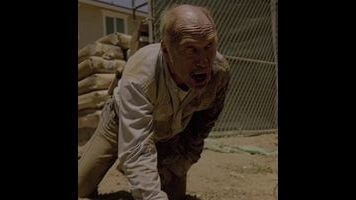The Bridge: “Eidolon”

If the major theme of season one of The Bridge was that Mexico and the United States are polar opposites bound by proximity, season two is illuminating how codependent and enmeshed the relationship between the two countries really is. It can be entirely boiled down to the conversation CIA Agent Buckley has with his superiors, nearing the end of the episode. Yes, he knew about the meeting at Red Ridge View. No, he did not know that the DEA would be involved. But the real weight of the conversation comes when it’s revealed that Fausto is not the self-made man that he’s projected himself to be throughout his arc on entire show. He’s a CIA plant whether he’s fully aware of that or not. Yet, in one scene, Fausto’s power is diffused. In his battle with Cerisola, the fist is only mightier than the money when the fist is propped by up by an even more aggressive body in the form of the United States. But just as Fausto unknowingly loses his power in the mind of the audience as a direct consequence of Buckley’s revelation that he hand-picked Fausto, the next scene shows Fausto’s attempts to retain that power through Cerisola’s daughter.
These threads—the CIA as ultimate power player, while Cerisola and Fausto face off for what the CIA turns a blind eye to—have been one of the highlights of the second season of The Bridge. One of the main criticisms I have had about the show’s first season was that it felt like many shows loosely tied together by a bunch of characters who were vaguely aware of each other. The second season is much more cohesive (other than some holdouts, like Linder and Eva who have been MIA for quite some time, and I honestly do not care whether they show up again or not). But these improvements are a double edged sword. Because of that unity of plot, the second season buries would the truly great show hiding on the margins of The Bridge. The show so often gets bogged down in the weight of its characters, and the remains of the structure of season one to let that show shine through. “Eidolon,” featuring this intense power struggle that does not take up as much time as other splashier aspects of the episode, is a prime example.
“Eidolon’s” other purpose was to expand upon Eleanor just as she is apprehended by Sonya and Marco. “Eidolon” called back to her introductory scenes in the first episode of the second season, “Yankee,” as she calls upon Monty Flagman for his assistance in the bloodied condo. Eleanor is a prime example of the truly interesting aspects of the story being buried in favor of the flashier flair. Eleanor’s backstory was revealed in “Lamia,” but her tale of the molestation and revenge are not what truly makes Eleanor dangerous. Her story fleshed out her character, but “Eidolon” gave even more insight into who she is than learning about the man who she keeps in a cage. Eleanor is skimming off the top. She so desperately needs her ledger not so she can protect Fausto, but so she can protect herself. Why does a Mennonite woman who lives sparsely need the extra cash? This detail gives her character a depth outside of her cartel duties. It makes her feel real, and not just weird for weird’s sake. She is not Fausto’s minion, she is in it for herself more than she lets on. Of course, this revelation was further buried by Eleanor’s own speedy recovery and torture of Hank for information, but at least we know why Eleanor was so intent on protecting her book.
As much as I liked the expansion of Eleanor into a grounded character, rather than one who is weird for weird’s sake, there were other character flaws that bothered me. Sonya, who has spent the entire series being unable to truly connect with anyone outside of established relationships, suddenly finds a kindred spirit in the mentally disabled Jaime, talking to him slowly and gently in order to get his story. Sonya is a good cop, but her niceties seemingly came out of nowhere. But it got Sonya and Marco to a point where Eleanor is in their custody, so Fausto can’t be far behind. They may be able to take down the leader of Jaurez cartel, but the real power—the CIA—may certainly prove more daunting.
Stray observations:
- If you have not read Sonia Saraiya’s interview with Matthew Lillard, do that now.
- Man, car crashes are super convenient in the world of The Bridge. First, David Tate knows exactly where and when to aim his car to capture Sonya and Gus in the first season, and now Sonya and Marco happen to be driving to Eleanor’s location just as she is departing, leading to their own collision. And I thought car crashes were just on a bitch for insurance premiums.
- “Wet naps are awesome.” They truly are.
- “I’m bleeding in your car.” “No worries, it’s leather. It’ll clean up fine. Just don’t die in the car. That’s bad luck.” Hear me out: A Monty Flagman cameo on the upcoming Better Call Saul.